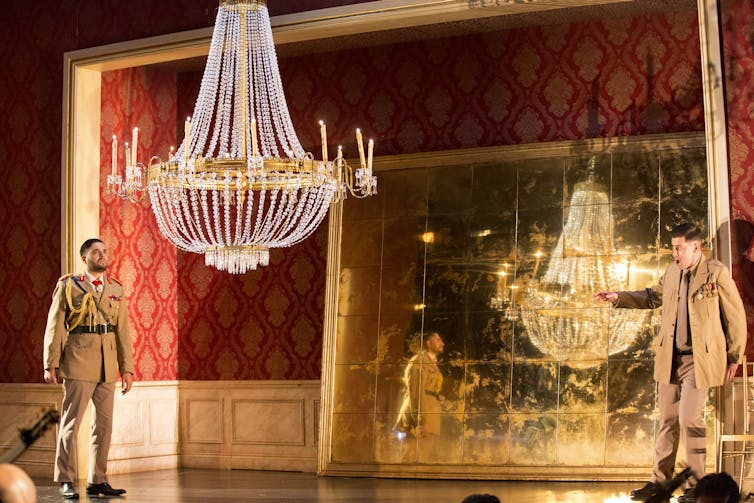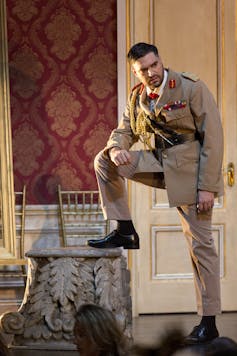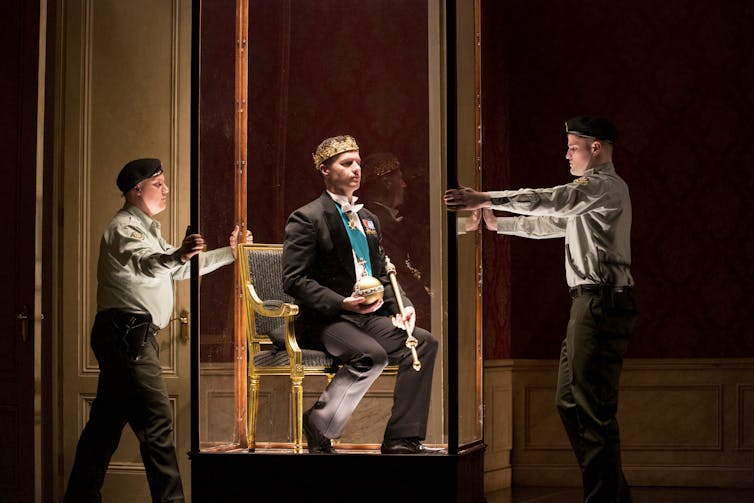Operatic goddess Vivica Genaux reigns supreme in a lyrical study of conflicting desires
- Written by Daniela Kaleva, Head of Teaching and Learning, Australian Institute of Music
Review: Artaserse, Sydney
The opera Artaserse, written by Pietro Metastasio and composed by Johann Adolphe Hasse, is emerging from centuries of oblivion, with recent revivals in Europe and Australia. This opera seria (Italian opera based on a classical or mythological subject) was a sensation during the 18th century.
There are 90 surviving musical settings of Metastasio’s exemplary libretto. The most acclaimed composer of opera seria, Neapolitan-trained Saxon Johann Adolf Hasse set it three times himself. Italian performer Farinelli premiered the male lead, Arbace, in Venice in 1730, whereas the female lead, Mandane, was reworked for Hasse’s famous wife Faustina Bordoni in Dresden in 1740.
The recent Australian premiere draws on archival material of the Dresden version. Securing American mezzo-soprano Vivica Genaux in the role of Mandane is by far the greatest sensation that Pinchgut Opera has brought to Australia.
The company’s focus on the historical performance of baroque repertoire is a breath of fresh air in the Australian operatic climate where well-worn core pieces are the norm, and the best international opera stars often come here at the end of their careers.
The best baroque specialists and young singers, both local and visiting, work with Pinchgut Opera. Pinchgut produces not only live performances but new editions and recordings. Under the baton of Dr Erin Helyard, innovation of sonic and contextual historical performance fuels their creative zest. This scholarly approach is attractive to revivalists such as Genaux who advocates Hasse’s music.
 Carlo Vistoli (left) and David Hansen as Arbace (right)
Brett Boardman
Carlo Vistoli (left) and David Hansen as Arbace (right)
Brett Boardman
Artaserse is an old Roman fable of treachery and the ethical power of clemency. The general Artabano attempts to seize power by killing King Xerxes of Persia. He wants to annihilate the royal family because the King would not accept his son Arbace as a suitable husband of princess Mandane. Prince Artaserse pardons the killer at the end.
In the hands of Metastasio, this banal story becomes a psychological study of conflicting desires through an elaborate scheme of relationships that results in an emotional rollercoaster. The audience reacted to the turns and twists with laughs and exclamations.
Charles Davis’ set and Ross Graham’s lighting transport the fable to modern times into the reception hall of a palace and create a strong sense of the suffocating predicament in which the protagonists find themselves.
Metastasio’s poetry is pure sonic theatricality. It leaves space for music to give flight to the subtlest of trepidations and the most violent passions. Hasse’s music is lyrical, granting the voice the freedom to thrive and shine. It is also surprisingly experimental within the constrictions of the opera seria formulae.
The Orchestra of the Antipodes played in full baroque splendour, delighting with sensitive continuo accompaniments during the recitatives and lush orchestral textures, especially in the melodramatic obbligato or orchestral recitatives and interludes during the arias.
 Carlo Vistoli as Artabano.
Brett Boardman
Carlo Vistoli as Artabano.
Brett Boardman
In this type of opera, the singers rule supreme. During the middle 18th century, they were the divine castrati (singers castrated in boyhood to retain their soprano or alto qualities). Solo singing dominates the recitatives and arias with repeated sections adorned by florid ornamentation. Genaux performed with an ensemble of modern “divine singers” with a rich palette of high voices.
Australian soprano countertenor David Hansen was the male romantic lead Arbace, son of Artabano in love with Princess Mandane. Alto countertenor Carlo Vistoli sang the villain Artabano. Soprano countertenor Russell Harcourt played the cunning and unscrupulous general Megabise in whom Artabano confides.
Tenor Andrew Goodwin was Prince Artaserse in love with Artabano’s daughter, Semira, performed by Australian mezzo-soprano Emily Edmonds. All singers possess fabulous vocal timbres and mastery of the style.
Carlo Vistoli delivered a heartfelt performance of the famous scene in Act 2 where his character shows remorse but was unconvincing as the intimidating old man. With the most beautiful tenor timbre and exquisite phrasing, Andrew Goodwin’s noble demeanour was touching, especially in Ah parti from Act 3, yet there could be so much more nuance in the way he approaches the text.
David Hansen offered an exciting romantic lead in the recitatives, but his over-physicalised coloratura (melodic ornamentation) distracted from the character during the arias. Russell Harcourt embodied the cunning Megabise well, narcissistically checking himself out in the big mirror and moving with authority on stage.
 Brett Boardman
Genaux is an operatic goddess. Dressed in a crystal-beaded, pale blue tulle and lace gown, she was the jewel on stage. Her feminine beauty and the velvety timbre of her voice are captivating and unforgettable. She is always in character, listens and responds generously to her colleagues. She sings and moves with ease and naturally even while firing the pyrotechnics composed for the mythical castrati.
It is this marriage of vocal virtuosity and immersion in the character that made her stand out from the rest of the cast. Her rendition of Và trà le Selve Ircane set ablaze the moral strength of the condemning princess who exposes the evil actions of Artabano. Such force and purpose in a society where women did not have a voice felt so empowering to witness.
What is most enticing about Genaux is that her singing is driven by an intimate knowledge of the text and internalised characterisation. Her coloratura is not only brilliant but emotionally connected to the drama. Such rhetorical performance renders a much-desired honesty that lights up the stage and exposes the essence of opera seria as an eloquent conduit of human emotions.
Artarserse is being staged in Sydney until December 5.
Brett Boardman
Genaux is an operatic goddess. Dressed in a crystal-beaded, pale blue tulle and lace gown, she was the jewel on stage. Her feminine beauty and the velvety timbre of her voice are captivating and unforgettable. She is always in character, listens and responds generously to her colleagues. She sings and moves with ease and naturally even while firing the pyrotechnics composed for the mythical castrati.
It is this marriage of vocal virtuosity and immersion in the character that made her stand out from the rest of the cast. Her rendition of Và trà le Selve Ircane set ablaze the moral strength of the condemning princess who exposes the evil actions of Artabano. Such force and purpose in a society where women did not have a voice felt so empowering to witness.
What is most enticing about Genaux is that her singing is driven by an intimate knowledge of the text and internalised characterisation. Her coloratura is not only brilliant but emotionally connected to the drama. Such rhetorical performance renders a much-desired honesty that lights up the stage and exposes the essence of opera seria as an eloquent conduit of human emotions.
Artarserse is being staged in Sydney until December 5.
Authors: Daniela Kaleva, Head of Teaching and Learning, Australian Institute of Music





